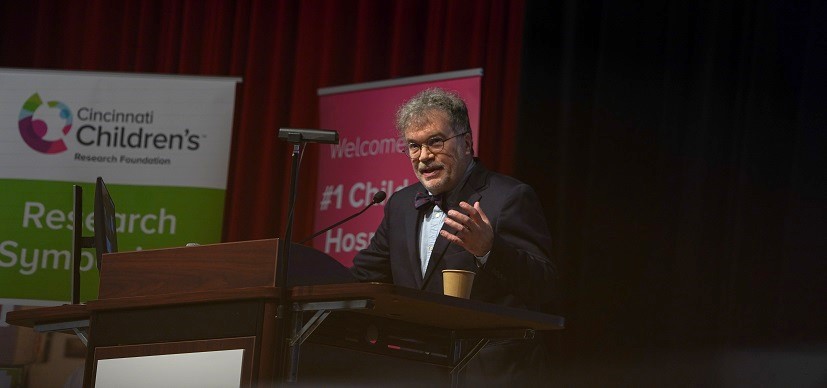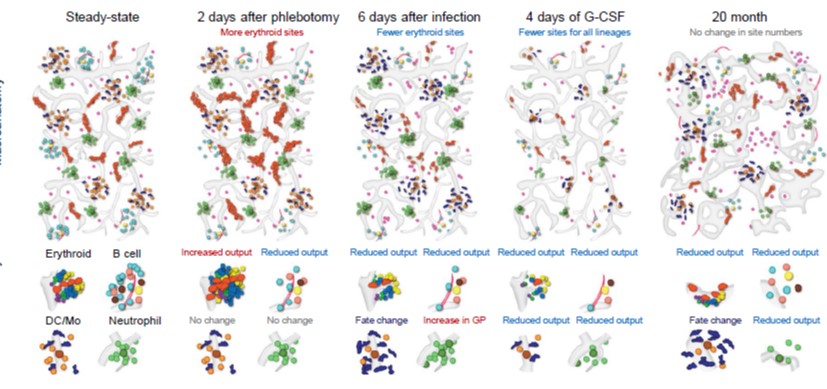RSV Vaccine Interim Analysis Offers Hope
Post Date: November 3, 2022 | Publish Date:

Amid a surge in respiratory syncytial virus (RSV) in Ohio and across the nation, the Cincinnati Children’s pediatrician who is principal site investigator for an RSV vaccine clinical trial says she sees hope for the future in an analysis shared by Pfizer on Nov. 1, 2022.
“This is very promising,” says Elizabeth Schlaudecker, MD, MPH, medical director of the Division of Infectious Diseases at Cincinnati Children’s, who is overseeing the local trial involving pregnant people vaccinated against the virus in hopes of passing protection on to their babies.
Pfizer reported that data showed the investigational vaccine helped protect newborns against severe RSV-related respiratory illness immediately after birth. Efficacy of the vaccine was 81.8% in infants through the first 90 days of life, based on observed severe medically attended lower respiratory tract illness. Substantial efficacy of 69.4% was demonstrated for infants over the six-month follow-up period. Based on the interim efficacy results, Pfizer said it plans to submit a Biologics License Application to the FDA by the end of 2022 for the vaccine candidate – followed by other regulatory authorities in the coming months.
RSV is the leading cause of bronchiolitis, or inflammation of the small airways that can make it difficult for babies to breathe.
“It can be very scary for parents,” Schlaudecker says. “A baby will be breathing really fast, and he or she can’t deal with all of the secretions that are coming into the lungs. So the baby has trouble breathing and eating, and sometimes requires IV fluids or oxygen. That’s what makes RSV so dangerous for babies.”
About 7,400 pregnant people in 18 countries were enrolled in Phase 3 of Pfizer’s MATISSE vaccine trial (MATernal Immunization Study for Safety and Efficacy). Pre-planned safety reviews conducted at regular intervals throughout the duration of the study indicated the investigational vaccine was well-tolerated with no safety concerns for the vaccinated individuals or their newborns, according to Pfizer.
“We’re still watching most of the infants in our study here at Cincinnati Children’s to see whether or not they develop RSV, which is circulating quite widely right now,” Schlaudecker says. “It’s unusual because we don’t usually see RSV this early in the season.”
RSV has been one of the most difficult viruses to manage for decades, she says.
“It remains one of the leading causes of hospitalization in kids around the world and causes over 100,000 deaths per year,” Schlaudecker says. “It is really, really hard to avoid. And not only does it affect infants, but it can affect other vulnerable populations such as older adults.
The National Institutes of Health estimate that RSV causes about 58,000 hospitalizations annually among children under 5 years old. RSV is estimated to cause about 14,000 deaths annually in U.S. adults older than 65. Each year throughout the world, the virus affects an estimated 64 million people and causes 160,000 deaths.
“Some of my worst experiences with RSV have been when I have worked overseas in Africa and seen babies who may not have the same access to medical care that we have here,” Schlaudecker says. “That was terrifying. It affects kids all over the world.”
Children tend to get RSV before 2 years of age. They are most vulnerable in the first few months of life, when they can’t form their own antibodies and their airways are very tiny.
“We’ve never really had a great treatment for it,” Schlaudecker says. “We basically support people with RSV by giving them oxygen, helping them breathe if they need a ventilator or helping them become more hydrated. We really don’t have specific treatments for RSV. So the best-case scenario is that we can prevent it from happening in the first place. We really want to protect those young infants, and that’s what this vaccine is showing that it can do.”
Phase 2a of the Pfizer trial, which involved non-pregnant women, demonstrated that the RSV vaccine was safe and prompted a good immune response. Preliminary data from Phase 2b indicated that the vaccine was both effective and safe in pregnant women, Schlaudecker says.
Now, many doctors who specialize in infectious diseases are concerned over a sort of triple epidemic of COVID, influenza and RSV at the same time.
“We’re hoping that everyone is getting their COVID and influenza vaccines to prevent those, and hopefully in the future we will have an RSV vaccine, too,” she says. “We aren’t there yet, but hopefully within a year or two the vaccine may be available for others to use.”






